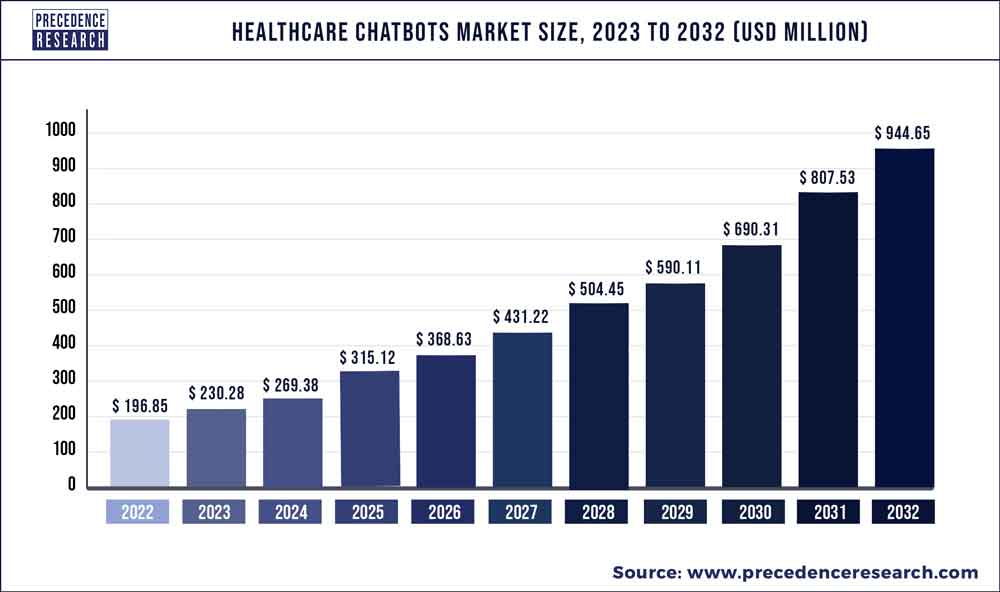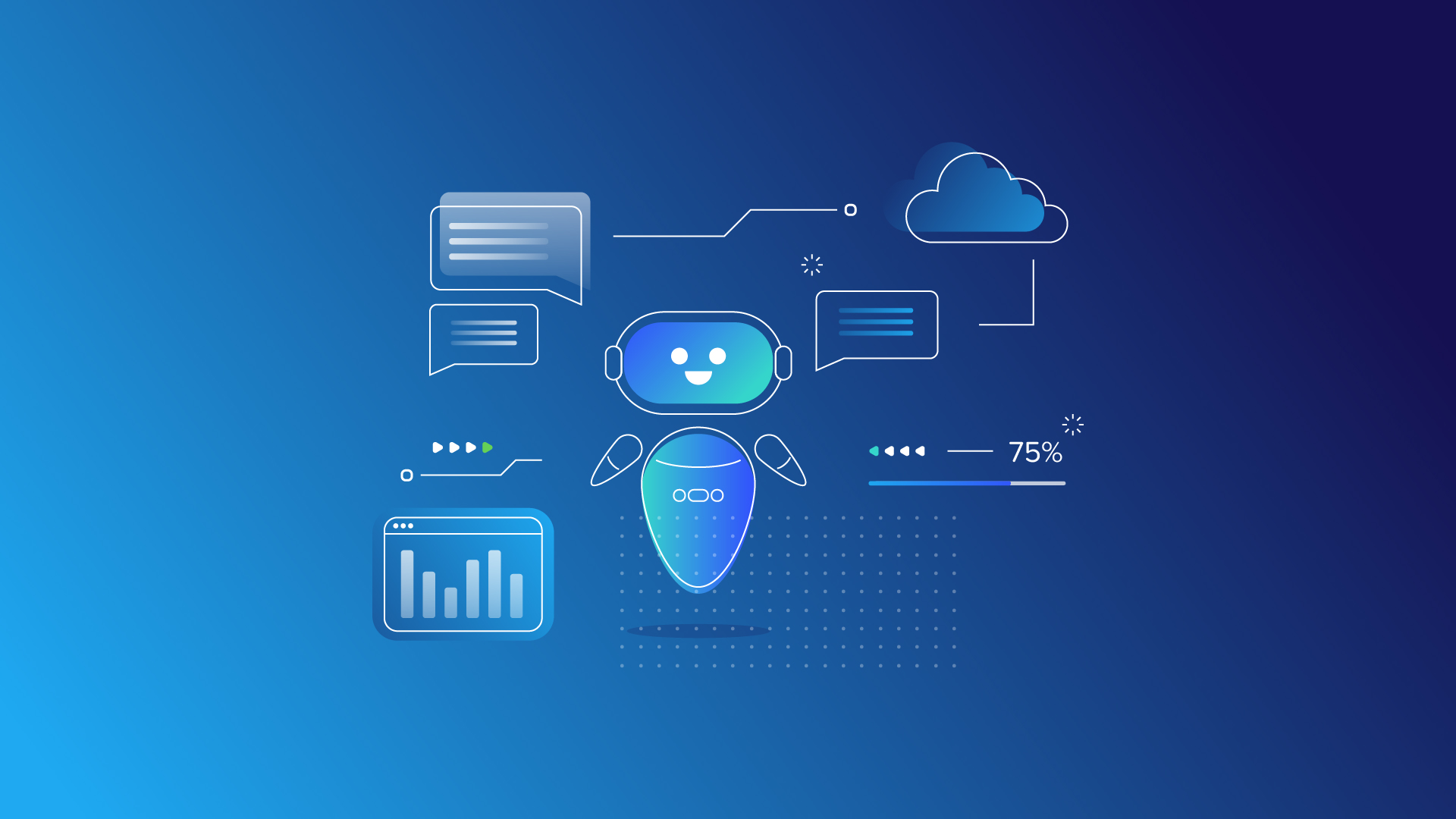Virtual healthcare is now a reality, and chatbots play a significant role in its implementation. With such a rapid pace of technological advancement, chatbots have turned into a key tool for many healthcare organizations and facilities. The transformative role of healthcare chatbots is hard to overstate, but what exactly is the role of these tools in the modern healthcare industry and why are they growing so prominent? Find out more about chatbot technology in healthcare and its importance in our guide.
What is a Healthcare Chatbot?
Chatbots are AI-powered applications, widely used in many industries. Their primary goal is to facilitate quick patient interactions concerning specific services or products. However, chatbots in healthcare industry are much more than just this simple definition. Patient-centric chatbot solutions hold transformative power that can improve communication between patients and healthcare workers while also facilitating healthcare automation in patient care. Chatbots can do many things, from checking a doctor’s availability to providing personalized recommendations to patients.
The global market size of healthcare chatbots reached US$300.6 million in 2023 and is predicted to reach US$1.3 billion by 2032, with a 17.29% annual growth rate over the next 8 years. This is due to many factors, such as the COVID-19 pandemic, the increased need for personalized medical services, and the growing recognition of chatbots’ role in healthcare research.

Benefits of Chatbots in Healthcare
The chatbot tech has been quite popular for many years now, but it’s only recently that it has been gained wider recognition in the healthcare sector. Here are some of the benefits of medical chatbots and virtual health assistants:
Around-the-clock availability
How often have you tried to contact your doctor’s office, only to realize that it’s past their working hours and you will have to wait at least until the next day to finally get a consultation from an expert? Issues with scheduling appointments and long wait hours are extremely common in healthcare. Healthcare chatbots are designed to partially solve this problem by providing medical assistance 24/7.
Access to important information
Chatbots can serve as a place for all important information on healthcare-related topics, such as guides on different conditions, nearby hospitals, and healthcare facilities, answers to common questions, etc. Instead of trying to reach out to medical professionals, a patient can now have all the needed info in the palm of their hand.
A chance to stay anonymous
Even though connecting with another human and getting their support is important, sometimes it does the opposite. Many patients are not comfortable sharing their stories and asking for help, which sometimes forces them to turn down any assistance and suffer on their own. Healthcare chatbots can become a great solution for many seeking answers and guidance who might be hesitant to share their problems with actual doctors.
Quick data collection
Chatbots in healthcare offer benefits not only to patients but also to organizations and facilities. Leveraging data is key to discovering new ways to enhance treatments. However, acquiring this data can present significant challenges, particularly for smaller healthcare entities. Chatbots serve as invaluable data sources for many organizations, offering a method to improve treatments and personalize healthcare.
Cost-effectiveness
High quality healthcare can be expensive. Additional expenses tied to healthcare services—like consultations, medications, and treatments—can be a burden for many patients, even in the countries where healthcare is free. Chatbots can decrease the cost of patient care without any quality loss by reducing the need for some costly services. Of course, chatbots are not meant to replace visits to hospitals or any treatments. However, they do have the power to decrease the price of patient support. Moreover, thanks to artificial intelligence in healthcare, it is possible for hospitals to reduce expenses as well, potentially up to 10%.
Types of Medical Chatbots
While there is a vast array of healthcare chatbots available, they can generally be categorized into three main types based on their purpose and the algorithms they employ:
Informative Chatbots
Informative chatbots use a less intrusive approach, and instead of asking questions, they simply provide information on different healthcare services. One of the methods for implementing an informative chatbot is through a FAQ chatbot, which provides a list of potential questions for users to choose from, along with automatic responses to each. These are relatively simple and easy to implement, so it might be the first type of chatbot a healthcare facility adopts.
Prescriptive Chatbots
This type of healthcare chatbots is similar to informative ones but offers a little bit more info and personalization. Prescriptive chatbots are designed to answer patients’ questions and use patient data to make recommendations. In other words, prescriptive chatbots can give tailored medical advice based on the user’s input. Some prescriptive chatbots might also use generative AI to answer a wider pool of questions.
Conversational Chatbots
Chatbots that can better converse with patients are called conversational chatbots. Thanks to natural language processing in medicine, conversational chatbots can better understand patient inquiries and personalize the responses. Bots built with the use of large language models process the conversation as a whole, making it possible to imitate human interactions and assist users with complicated requests.
Main Use Cases & Examples of Chatbots in Healthcare
Let’s take a look at some real-world examples of health chatbots and how they can enhance patient-doctor communication:
Reminders for patients
There are just too many things to keep in mind, even if you write them all down. Vaccinations, pills, prescriptions, or appointments, on top of other routine activities, can often be forgotten until the last minute, making healthcare AI chatbots that remind you of those an extremely valuable tool. Medical care facilities can create chatbots that offer gentle nudges and reminders when needed.
Telehealth
Telehealth chatbot applications can serve as appointment tools and quick assistance with urgent questions. For example, bots can monitor the available slots and send recommendations based on the patient’s needs. If there is a complicated case or a situation where the chatbot can no longer assist the individual, it can automatically offer a quick consultation with an expert and redirect the patient to someone who can either offer them comprehensive support or guide them toward the next steps.
Healthcare insurance
Insurance companies, in collaboration with hospitals and other facilities, can create chatbots that help patients make appointments and submit insurance claims. In addition to guidance with making claims, chatbots can also assist patients with many questions regarding their insurance, such as coverage or specific services.
Feedback collection
What’s faster: answering a few short questions in a chatbot or talking to a medical representative for at least 10-15 minutes, discussing the visit to the doctor or any other appointments? With AI technology, it is possible to create a bot that helps collect feedback and personalize questions for patients to ensure their comfort and satisfaction. Healthcare facilities can gather patients’ opinions in just a few seconds, making this process quick and easy for both sides.
Patients’ education
Sometimes, there are just too many questions and too little time allocated for doctor’s appointments. That is why, many look for the answers online, which is not always ideal due to the lack of credibility of internet resources. Chatbots for medical consultations can solve this problem by offering information verified by real experts, as well as consulting patients on different topics.
Diagnosis estimation
Even though healthcare chatbots cannot replace real doctors, they can help patients assess their conditions and take the first step toward discovering the right diagnosis. With personalized healthcare technology, chatbots can use the data patients enter to determine what their symptoms might indicate, offering recommendations based on the patient’s medical history and current condition.
Therapy
When surveyed about the perceived importance of chatbots, 77% of professionals and experts in mental health considered chatbots to be somewhat important (66%) or very important (11%). In contrast, 23% felt that chatbots were somewhat unimportant (20%) or very unimportant (3%).
Working with a licensed medical professional is always the best choice, but it might not suit everyone. Therapy sessions can be costly, and for many people, it can be uncomfortable to talk about their state and feelings. Of course, a healthcare chatbot cannot diagnose any mental health problems and solve them, but what it can do is provide the necessary support in just a few seconds, which is, in many cases, enough to relieve the patient and provide immediate coping strategies.
Future of AI Chatbots for Healthcare
The AI revolution is happening as we speak. Will it also impact how bots interact with people? It’s likely that chatbots will become an even more effective and engaging tool that improves the lives of many, both healthcare industry workers and patients alike. Here are the key trends for AI chatbots in the healthcare industry:
- Chatbots will have more human interactions. Talking to a bot will be more human-like, almost as if another person is answering your questions and assisting you with your problems. A technology like this already exists: GPT-4o, a flagship model of the leading AI-powered chatbot, can chat with users with the help of voice, video, and images, understand and display emotions, and adjust responses based on requests.
- Greater adoption of medical chatbots. As previously mentioned, the chatbot market only continues to grow. Even though it is already a popular technology, even more organizations will start using chatbots to streamline communication with patients and enhance patient care.
- More integrations. Chatbots will not only be used by almost every company out there but they will also be integrated into different apps and programs. For example, a chatbot integrated into a mobile health app can respond to users’ questions about their condition, analyze symptoms, and even advise on what a patient should do to deal with their current health problems.
- AI assistants. Chatbots will become even more helpful, evolving into assistants that guide patients through their health journey and assist them daily. AI assistants may be able to talk to patients at any time, offering advice and providing support during difficult times. Humans and AI-powered applications will become inseparable, making everyday tasks and caring for yourself much easier.
Of course, these are not the only trends on their own in the healthcare industry. A lot more is to come, and we look forward to what the future brings.
Final Thoughts
There are many exciting changes and advancements on the horizon, so the best thing healthcare providers can do is brace for innovations and integrate them into their workflows. Healthcare chatbots are here to stay, and it’s likely they will make an even greater impact than the community anticipates. AI-driven patient support is the future, and soon, we will witness even more instances of how it can save lives and enhance the quality of care.
If you feel ready to integrate life-changing software into your healthcare practice, contact our experts today to discuss how eWizard can help you streamline operations and improve communication with patients.
